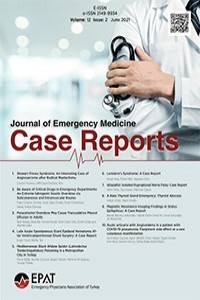CONCURRENT PULMONARY EMBOLISM AND ACUTE MYOCARD INFARCTION: A CASE REPORT
İntroduction: Pulmonary embolism and ST-elevation MI are both life threatening diseases. Although rare, concomitant pulmonary embolism and myocardial infarction pose even greater risk. Here we aimed to report a case of ST-elevation acute coronary syndrome developing one hour after diagnosis of pulmonary embolism.
Case-Report: A 48-year-old male patient with known coronary artery disease had admitted for chest pain and dyspnea. He had got deep vein thrombosis in 10 days prior to this presentation. There wasn’t ST elevation on his electrocardiogram. Pulmonary embolism was detected in the pulmonary CT angiography taken to the patient. The ECG was repeated after the patient, whose treatment was started, had new chest pain and sweating. The patient, whose ST elevation was detected in the inferior leads in the new ECG, was taking in to PCI. The patient, who had a stent in RCA, left the hospital voluntarily on the 3rd day of his admission to the coronary intensive care unit from where he was hospitalized with the diagnosis of ACS and PTE.
In conclusion, it should be kept in mind that these two conditions may be present in patients presenting with complaints suggesting both AKS and PTE such as chest pain and shortness of breath.
Keywords:
Chest pain ECG, ST elevation, ACS, PTE,
___
- Referans1. American College of Emergency Physicians Clinical Policies Subcommittee (Writing Committee) on Thromboembolic Disease:, Wolf SJ, Hahn SA, Nentwich LM, Raja AS, Silvers SM, Brown MD. Clinical Policy: Critical Issues in the Evaluation and Management of Adult Patients Presenting to the Emergency Department With Suspected Acute Venous Thromboembolic Disease. Ann Emerg Med. 2018 May;71(5):e59-e109. Referans2. Yeh KH, Chang HC. Massive pulmonary embolism with anterolateral ST-segment elevation: electrocardiogram limitations and the role of echocardiogram. The American journal of emergency medicine. 2008;26(5):632 e1-3. Epub 2008/06/07. Referans3. Joseph Marc S. Seguban, Elaine Alajar, Jessore Isidro, Noemi Pestaño, Felix Eduardo et al. Concurrent Massive Pulmonary Embolism With Emboli in Transit and Anterior ST Elevation Myocardial Infarction with Increased Bleeding Risk Successfully Treated with Low-Dose Systemic Alteplase: A Case Report. Cardiology and Cardiovascular Medicine 3 (2019): 352-359. Referans4. Alkhalil M, Cahill TJ, Boardman H, Choudhury RP. Concomitant pulmonary embolism and myocardial infarction due to paradoxical embolism across a patent foramen ovale: a case report. Eur Heart J Case Rep. 2017 Nov 23;1(2):ytx010. Referans5. Cheng TO. Mechanism of ST-elevation in acute pulmonary embolism. International journal of cardiology. 2005;103(2):221-3. Epub 2005/08/06. Referans6. Van Mieghem C, Sabbe M, Knockaert D. The clinical value of the ECG in noncardiac conditions. Chest. 2004;125(4):1561-76. Epub 2004/04/14. Referans7. Wang K, Asinger, R. W., Marriott, H. J. L. ST-Segment Elevation in Conditions Other Than Acute Myocardial Infarction. . N Engl J Med. 2003;349(22):2128-35. Referans8. Wilson GT, Schaller FA. Pulmonary embolism mimicking anteroseptal acute myocardial infarction. The Journal of the American Osteopathic Association. 2008;108(7):344-9. Epub 2008/07/24. Referans9. Lin JF, Li YC, Yang PL. A case of massive pulmonary embolism with ST elevation in leads V1-4. Circulation journal : official journal of the Japanese Circulation Society. 2009;73(6):1157-9. Epub 2008/12/20. Referans10. Livaditis IG, Paraschos M, Dimopoulos K. Massive pulmonary embolism with ST elevation in leads V1-V3 and successful thrombolysis with tenecteplase. Heart. 2004;90(7):e41. Epub 2004/06/18. Referans11. Falterman TJ MJ, Daberkow D, Weiss LD. Pulmonary embolism with ST segment elevation in leads V1 to V4: case report and review of the literature regarding electrocardiographic changes in acute pulmonary embolism. J Emerg Med. 2001;21(3):255-61. Referans12. Wąsek WC, Samul W, Ryczek R, Skrobowski A. Unique case of ST-segment-elevation myocardial infarction related to paradoxical embolization and simultaneous pulmonary embolization: clinical considerations on indications for patent foramen ovale closure in no-guidelines land. Circulation. 2015 Mar 31;131(13):1214-23. referans13. Budavari AI, Glenn TJ, Will KK, Askew JW, Fortuin FD. A case of simultaneous pulmonary embolism and acute myocardial infarction secondary to a previously undiagnosed patent foramen ovale. J Hosp Med. 2009 May;4(5): E5-9. Referans14. Burkhardt C, Eeckhout E, Qanadli SD, Aubert JD, Meier JM. Simultaneous Acute Pulmonary Embolism and Isolated Septal Myocardial Infarction in a Young Patient. Eur J Case Rep Intern Med. 2016 Aug 24;3(6):000436
- Başlangıç: 2010
- Yayıncı: Alpay Azap
Sayıdaki Diğer Makaleler
Özlem GÜLER, Mehmet Bugra BOZAN, Seda NİDA, Enes Ömer GÜNGÖR
Muhammed EKMEKYAPAR, Hakan OĞUZTÜRK, Tuba EKMEKYAPAR, Şükrü GÜRBÜZ, Serdar DERYA
Birdal YILDIRIM, Ethem ACAR, Ahmet DEMİR, Kemal GÖKÇEK, Ahmet AKSAKAL, Özcan BAŞARAN
Mehmet Ali YAVUZ, Ramazan ASOGLU
Tuba EKMEKYAPAR, Muhammed EKMEKYAPAR, Şükrü GÜRBÜZ, Hakan OĞUZTÜRK
Takashi HONGO, Hiroki SUGİYAMA, Hiromichi NAİTO, Atsunori NAKAO
